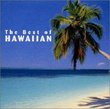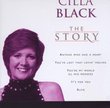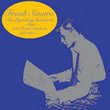| All Artists: Scott Ross Title: Scarlatti: The Keyboard Sonatas [Box Set] Members Wishing: 0 Total Copies: 0 Label: Warner Classics Original Release Date: 1/1/2005 Re-Release Date: 10/11/2005 Album Type: Box set Genre: Classical Styles: Chamber Music, Forms & Genres, Sonatas, Historical Periods, Baroque (c.1600-1750), Classical (c.1770-1830) Number of Discs: 34 SwapaCD Credits: 34 UPC: 825646209224 |
Search - Scott Ross :: Scarlatti: The Keyboard Sonatas [Box Set]
CD DetailsSimilar CDs
|
CD ReviewsAn amazing accomplishment Samuel Etler | Cupertino, CA USA | 10/19/2005 (5 out of 5 stars) "This recent re-release of Scott Ross's complete recordings of Scarlatti's keyboard sonatas is truly a great a accomplishment. The 34 CDs contain all 555 sonatas. The vast majority are played by Ross on the harpsichord, or harpsichord's I should say. Four different harpsichords were used, one Italian and three French. While various groups of Sonatas might sound a bit different it doesn't take away from the experience at all. And what an experience it is. Ross's harpsichord playing is bright and lively when required, relaxed and subdued at other times. While it's hard to imagine that Ross was able to become intimately familiar with 555 sonatas over the year it took to record them, his performances do not show any signs of boredom. The sonatas are overall focused and well performed. In addition to the hundreds of harpsichord sonatas, there are also recordings of Scarlatti's five sonatas with string and woodwing accompaniment as well as his three organ sonatas. All keyboard parts are played by Ross. The packaging of this set is very compact. Each CD is in a thick paper cover, the whole of the set in a single box. There is also a 255 page booklet that contains a short description of nearly every sonata. Additionally there is an interview with Ross from 1986. This is a wonderful set for any fan of Scarlatti and Ross. And at the price, it would even be worth it for anyone who enjoys Baroque harpsichord music but isn't familiar with Scarlatti. I highly recommend this set." Definitive Scarlatti James W. Neill | Reston, VA USA | 05/26/2007 (5 out of 5 stars) "I've been a Scarlatti fan since I discovered the Ralph Kirkpatrick recordings on Columbia when I was in high school--some 40 years ago. Over the years I have played some of them on the piano and collected numerous recordings, performed on both harpsichord and piano. I first purchased Scott Ross's complete collection after sampling the 3-CD Scarlatti Anthologie and being pleased with what I heard. After listening to about a third of the 34 CDs on which the 555 sonatas are recorded I can say that Scott Ross's performances equal or exceed anything I've heard from any other performer on harpsichord. There are recordings by other performers I rate very highly--Wanda Landowska's characterful pre-WW II recordings and Andras Schiff's superb piano recordings of the sonatas come to mind--but Scott Ross has it all. Meticulous accuracy, a truly engaging sense of rhythm--so critical in bringing out the character of the sonatas, a superb sense of the Spanish idiom Scarlatti uses, elegant ornamentaion, a masterful selection of stops, and the wonderful recorded harpsichord sound all make this set a thoroughly satisfying musical experience for the Scarlatti lover. Bringing all of this quality to the formidable task of recording all of Scarlatti's 555 sonatas is a tremendous achievement and a true service to the music loving public. In addition to the pleasure of having such a treasure trove of great Scarlatti performances, the complete collection has afforded me the oppotunity to discover many elegant gems among Scarlatt's lesser known sonatas--the kind that stay in my head days after hearing them. That Ross died at the relatively early age of 38 was a real loss. If you're a Scarlatti fan, treat yourself to this complete collection. You won't be disappointed." Big box of joy Jed | UK | 03/22/2008 (5 out of 5 stars) "Domenico Scarlatti is to 18th century keyboard music as to what Chopin was to 19th century piano; both were geniuses who composed for virtually one instrument, Chopin for the piano and Scarlatti for the harpsichord. However unlike Chopin Scarlatti never *quite* became as much of a household word as Chopin. Which is a pity as I consider him one of the best three composers of keyboard music ever.
As for the music itself, well that's always a problem with a written review. How do you describe something as subjective and intangible as music? Without wanting to look impressive or pretentious by giving obscure musical terminology I'll at least assume the reader knows the difference between major and minor keys. Major keys tend to sound happy and minor keys tend to sound sad. I'd estimate roughly 80% of Scarlattis work is in major keys so he's far from a brooding sourpuss. Most of his sonatas are exhilarating to listen to, not just for the technical accomplshment but for the sense of joy, even triumph his music can evoke. The 555 sonatas amply demonstrate his astonising gift for melody. However this is not really music to relax too, unlike say Erik Satie. The notes come thick and fast, and even the rarer melancholic sonatas he wrote are still not exactly soothing. That is not meant as a criticism, but I thought it worth mentioning in case you wanted this set to "chill out" too! Yes the set is expensive. If you want just to sample Scarlatti then there are probably wiser buys on Amazon. But if you get hooked on Scarlatti then this set is going to be hard to resist." |

![Scarlatti: The Keyboard Sonatas [Box Set]](https://nationalbookswap.com/cd//l/35/9535/6129535.jpg)



